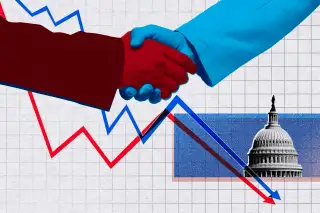Why the Debt Ceiling Deal Could Actually Hurt Stocks

Last week, lawmakers reached a deal to raise the debt ceiling, averting a potentially disastrous default and allowing investors to breathe a sigh of relief — at least for now.
In the lead-up to the agreement, market watchers urged investors to brace for potential market volatility due to all the uncertainty over whether (and how) a deal would come to fruition.
Now that a default has been avoided, some experts are warning that raising the debt ceiling could actually hurt stocks over both the long and short term. Here’s what investors should know.
If investors were expecting an immediate stock market boom as a result of the deal, they may be disappointed.
The fundamental challenges facing stocks — like high interest rates and recession fears — are still there, says Rob Haworth, senior investment strategy director at U.S. Bank Wealth Management.
The deal is “unlikely to be a catalyst for change to fundamental factors like corporate earnings, for example, that will likely impact stock prices over the course of 2023 and beyond,” Haworth said in a recent blog post. And in the short term, he warns that there could be more volatility ahead.
Could the debt ceiling deal send stocks lower?
The new law increases the cap on the amount of money the U.S. is allowed to borrow to meet its financial obligations — think Social Security payments, military salaries, bond payments and more.
The government gets the money it needs for those payments by issuing bonds. Now that the cap on borrowing has been raised, the Treasury Department is allowed to issue new bills. Experts at Morgan Stanley anticipate about $1.2 trillion in Treasury bills to hit the market by the end of the year.
Right now, there's concern about whether there’s actually demand for all this new debt, explains James Angel, a finance professor at Georgetown University. Given that that the U.S. has only narrowly averted a debt default and rattled global investors in the process, Angel says it's not yet clear whether investors will be eager to buy the new debt.
If there aren't enough buyers for the T-bills, their prices will fall and their yields (the interest rate the government pays on the bonds) will rise. That’s "going to push up the price that the government has to pay," Angel explains, which could then "push up the price that everybody pays for everything, from car loans to mortgages and everything else." (Expectations about short-term interest rates can influence consumer interest rates, and higher government costs often trickle down to banks and eventually consumers.)
When higher interest rates also get passed on to businesses and consumers, corporate profits and investors’ confidence about the economy can both suffer.
“That tends to have a depressing effect on the stock market,” Angel says.
But it's certainly not guaranteed: Angel notes that a “relief rally” that sends stocks higher in the aftermath of so much uncertainty is also possible.
A liquidity drain could hurt the stock market
On a more granular level, experts are also worried about the loss of market liquidity that could accompany all the new Treasury debt.
Liquidity refers to how easy it is to buy and sell assets, with more liquid assets like stocks being easier for investors to move quickly. Bonds are generally considered less liquid than stocks because of their baked-in maturity dates — you buy a bond for a set period of time, and collect interest over the course of that period.
The government issuing all that debt to investors could restrict money that would have otherwise been freely flowing through the financial system and potentially used to buy stocks. Instead, that money will be sitting with the Treasury Department while investors wait to collect interest on government debt.
That could also have major ramifications for the banking sector, which has struggled this year amid several high-profile bank collapses. Less money flowing through the financial system will "potentially further [challenge] already beleaguered banks," says Seema Shah, chief global strategist at Principal Asset Management. Banks could struggle to maintain their cash reserves if lots of investors suddenly buy the new T-bills, which is yet another risk for the stock market.
Morgan Stanley strategists led by Michael Wilson recently warned investors that the loss of liquidity could be a catalyst for a pullback in the stock market. They expect the S&P 500 index to end the year at 4,200 points — 1.5% lower than Wednesday's levels.
“Historically, such drains on liquidity have not boded well for equity prices, and this time should be no different,” they wrote in their mid-year stock outlook this week.
How the New Debt Ceiling Deal Could Affect Your Wallet, From Student Loans to Food Benefits
Investors Should Brace for ‘Significant Volatility’ as the Debt Ceiling Standoff Continues
What's Going on With the Debt Ceiling? 6 Common Questions, Answered